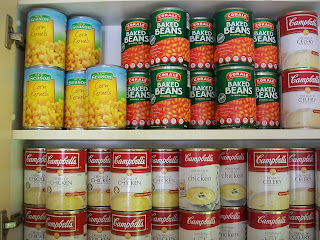I know of people who shop every day for that night's meal. I also know of people who only keep a couple of week's worth of groceries and they always seem to be running out of the basics. This is no way to live your life. Think of all the stress and extra trips to the supermarket. Think of all the petrol being used. Here are some scenarios to think about -
What if you got sick ?
What if the car breaks down ?
What if family drops in unexpectedly for a holiday ?
What if your teenagers bring home a bunch of friends and expect a meal for all ?
What if your spouse invites some friends home for a meal without a prior arrangement ?
What if a natural disaster happens and it wipes out crops ?
What if you are stranded in your home due to floods ?
How would you cope if any of these things happened ? Yes they could easily happen although I really hope they don't. Do you go into a panic and order takeaway ? That would be so easy but then your food budget would blow out. A better way is to have a good supply of basic ingredients.
Stockpiling is as easy as 1 2 3 .
1. Write out a list of basic ingredients that you would like to stockpile. Toiletries such as toilet paper, deodorant, shampoo, conditioner, soap, shower gel, shavers, makeup all keep well for many years. In the pantry - flour, sugar, pasta, rice, tinned veggies and fruit, herbs and spices, baking ingredients, spreads, powdered milk, sauces etc all keep well.
In the fridge - cheese and butter can be stockpiled as well as frozen. Even eggs keep well in the fridge for a few months. In the freezer you can stockpile veggies, meat, leftovers, ready made meals ( homemade of course ) berries and other fruits.
2. Work out the quantities of these items you use per month. Then multiply it by the amount of months you want to have as a stockpile.
3 . Add some of these EXTRA items and quantities to your shopping list each week / fortnight / month you go shopping. Remember, these are extra quantities on top of what you usually buy. Once you have finished stockpiling all you need to do is just replace the items you use. Also, do not forget to rotate your stock by putting new items to the back of the pantry, fridge and freezer and the older items get pushed to the front.
Finding extra grocery money for stockpiling can be a challenge if you are on a tight budget. Please keep in mind that basic groceries like flour, sugar and pasta etc don't cost that much. Here are some ideas for finding extra grocery money -
* Use leftover holiday spending money. This is how I started my food slush fund.
* Make your own takeaway and the money saved could start your stockpile.
* Revise your shopping list and cross off ready made / processed food.
* Cook cheaper meals to stretch your $$$
* Save your spare coins in a tin. At the end of the month that money can be used to buy a few extra basics.
Do you have a stockpile and if so, how long would it feed your family ?
If you haven't started a stockpile, is this something you'll do shortly ?
 |
| My spare tins of food. |
 |
| An organised pantry |
 |
| My spares. I love things stacked neatly |
No comments:
Post a Comment